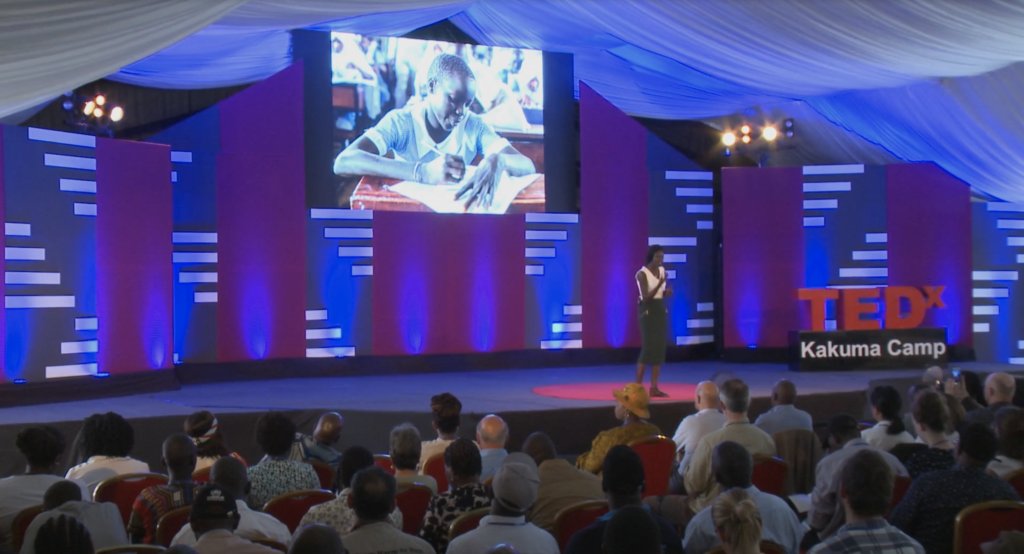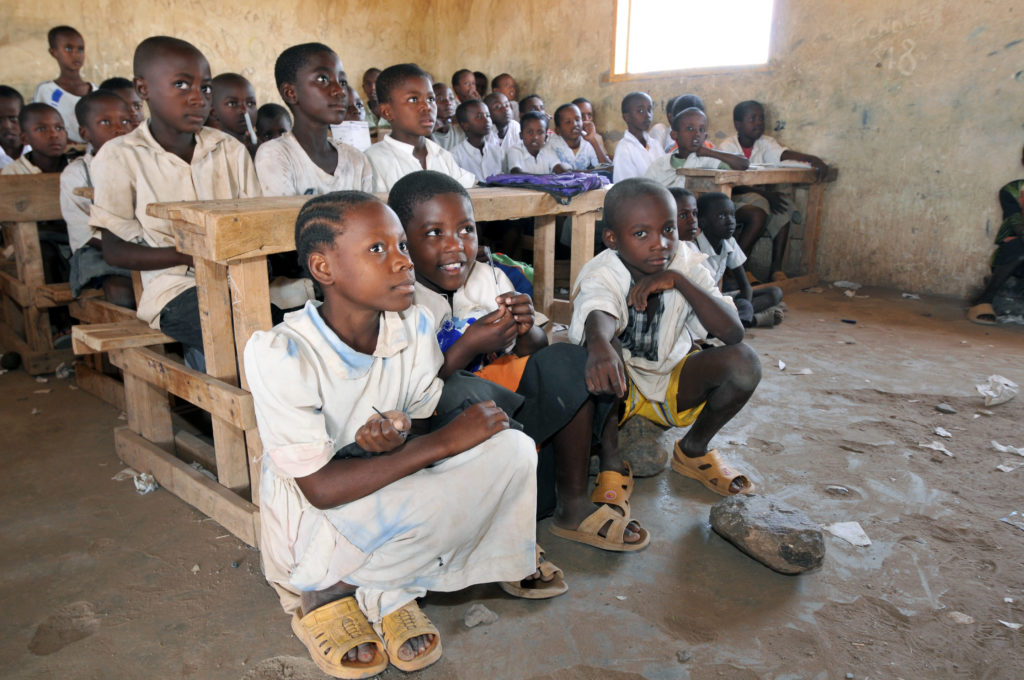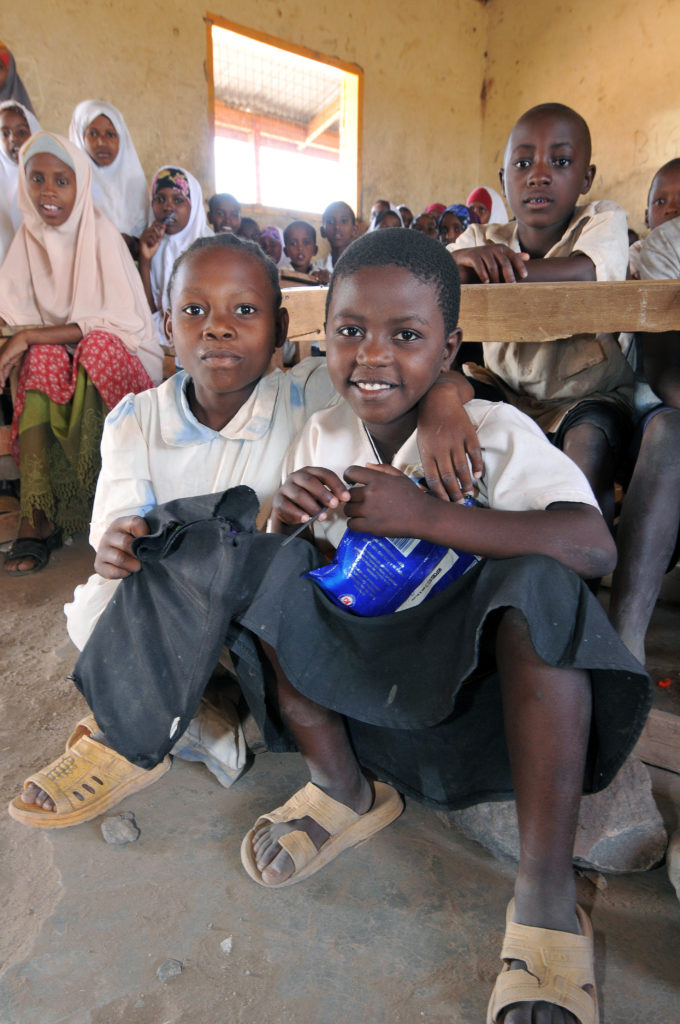‘Educating a girl will create equal and stable societies, and educated refugees will be the hope of rebuilding their countries someday. Girls and women have a part to play in this just as much as men.’
Mary Maker, 2018: ‘Why I fight for the education of refugee girls (like me)’

Mary Maker was born in a country that has barely experienced peace: South Sudan. While still part of Sudan, it experienced decades of imperialism followed by long-running civil wars; and conflict and ethnic violence have continued since South Sudan became an independent country in 2011, despite short-lived ceasefires and peace agreements.
This ongoing conflict has forced many, including Mary, to flee their homes. It was in the Kakuma Refugee Camp in Kenya that Mary remembers first hearing the sound of silence: ‘no gunshots, peace at last.’ As well as finding immediate pockets of peace there, Mary also began discovering the tools for sustainable peace-building. It was there that she started her educational journey, and it was in that same camp that she became a teacher herself after completing her high school education.

Photo by D. Willetts (Education for All Global Monitoring Report, 2011)
Her TED Talk at TEDxKakumaCamp (2018) tells a success story of how education can be one of the most powerful tools to establish peace, providing war refugees with the tools for rebuilding their communities wounded by conflict.
This talk narrates peace through the words of a woman who has experienced war and loss on her skin and found in education the tools to overcome her trauma and be able to visualise future peace for her country, South Sudan. In particular, she explores the theme of women as changemakers in a culture that does not believe in the importance of their education and their role in rebuilding the country. Maker herself experienced challenges in this regard. From the example of her uncle disregarding her education as secondary to her male brothers’ to the feeling of being feared in her community for being an educated woman, she narrates the struggle of many other girls who might not be as lucky as her to have the resilience and support to react to this situation.
This sparks reflection on how participatory the process of rebuilding a country can be, if resources and hope are invested mainly in boys. As Maker points out, ‘Education creates an equal and fair chance for everyone to make it.’ For this reason, peace-making programmes should invest in and promote education that is inclusive of all. A fundamental step in rebuilding a society and preventing future conflict is the eradication of inequalities, and education has a crucial role to play in this. Analysing this talk through the lenses of the UN Sustainable Development Goals (SDGs), Mary Maker’s words acquire even more relevance. Educating young refugees, especially young girls who often have less access to classrooms and textbooks, positively contributes to the achievement of SDGs 4 (Quality Education), 5 (Gender Equality), 8 (Decent work and economic growth) and 10 (Reduced inequalities)[i]. Working on the targets of these SDGs is crucial in the phase of post-conflict recovery, when the ultimate goal is building sustainable peace and a positive future for everyone in the community.
Another important aspect that emerges in Mary’s speech is the value of education as a copying mechanism to help young refugees heal from the experience of war:
‘Education heals. The school environment gives you a focus to focus ahead. Let’s take it this way: when you’re busy solving mathematical equations, and you are memorising poetry, you forget the violence that you witnessed back home. And that is the power of education: it creates this place for peace.’

(Education for All Global Monitoring Report, 2011)
In education we can identify the coexistence of inner peace and external conflict, and the fundamental role that inner peace plays in visualising future peace. The temporary relief that focusing on notions and books provides is functional to put a ‘child of war’ in the position and mental state to be able to conceive a future beyond conflict, beyond the reality that permeates their everyday life experience.
Mary Maker’s TED talk thus helps us think about various ways in which education can help bring and build peace. In particular, it is a call for more investment in the education of refugees, given the role that this can play in catalysing important social changes and greater gender equality, which in turn support the twin goals of peace and sustainable development in post-conflict zones. In terms of concrete actions in this regard, many organisations have already recognised the importance of providing scholarships specifically for refugees to increase their opportunities to be change-makers in their communities. One example is an initiative launched by United World Colleges, a network of 18 schools and colleges dotted all around that world that promotes education as a ‘force to unite people, nations and cultures for peace and a sustainable future’.[ii] In 2016, UWC launched the Refugee Initiative to provide 100 additional scholarships per year for students with a refugee background, acknowledging that ‘Refugee communities need future leaders with strong abilities, social consciousness and drive for peace and reconciliation.’ The UWC Movement was nominated for the Nobel Peace Prize 2022 by Alfred Bjørlo, member of the Norwegian Parliament.
What do you think?
- What roles can education play in peace-building?
- To what extent does education of young women foster gender equality from a social, economic and political point of view
- Why is gender equality crucial to peace-building?
- In what practical ways can the education of refugees contribute to building sustainable cities and communities (SDG11) and sustainable peace-building?
If you enjoyed this item in our museum…
You might also enjoy ‘Unlearning War‘, ‘Lament for Syria‘, ‘The Ash that Travelled‘, ‘A Blank Newspaper‘ and items with the tag ‘Inclusivity‘.
Lia Da Giau, May 2022
[i] More resources on the correlation between education of refugees and achievement of the UN SDGs: https://www.unhcr.org/5efcb5004.pdf, https://www.refworld.org/pdfid/59c368ed4.pdf. This 2017 TED talk is also worth listening to: ‘Don’t feel sorry for refugees — believe in them.’
[ii] Read more about the UWC movement here: https://www.uwc.org/about.